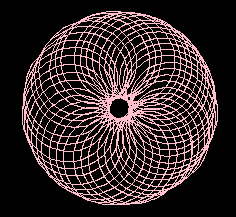Adiabatic Invariants in Planetary Motion
In our simulation of Jupiter's effect on Earth's orbit, if we
abruptly increase Jupiter's mass by around a factor of 100, the
Earth flies out of the solar system.
What happens if we gradually increase Jupiter's mass? (Say, Jupiter
is used as a cosmic garbage dump, and gets heavier over a period of
thousands or tens of thousands of years.) Try gradually increasing
the Jovian mass; does the Earth seem more stable? (To do this in
a fairly controlled way, you can click on the little arrow to the
right of the slider. Change the increment by clicking on the vertical
bar just above the arrow.)

This started as Earth's orbit with Jupiter massless, and slowly increased
until Jupiter was 50,000 Earth masses. Had the increase been sudden,
the Earth would have departed at a lower mass.
Changing things adiabatically (slowly) produces very different results
from changing them abruptly.
Questions
- Adiabatic invariants are quantities which do not change as the
parameters in the system change. I'm guessing that there are some
adiabatic invariants for this problem. Can you find them (either in
the literature, by numerical investigation, or by analytical work)?
Jupiter:
How to Get Jupiter
Jupiter is available
for Windows 95, Windows NT, Macintosh, and several Unix platforms
(the IBM RS6000, Sun Sparc, Dec Alpha (courtesy Kamal Bhattacharya),
Linux, and the PowerPC running AIX4.1).
The files are available without charge by anonymous FTP
(ftp.lassp.cornell.edu) or
via
the World Wide Web.
Last modified: May 19, 1996
James P. Sethna,
sethna@lassp.cornell.edu.
 Statistical Mechanics: Entropy, Order Parameters, and Complexity,
now available at
Oxford University Press
(USA,
Europe).
Statistical Mechanics: Entropy, Order Parameters, and Complexity,
now available at
Oxford University Press
(USA,
Europe).




![]() Statistical Mechanics: Entropy, Order Parameters, and Complexity,
now available at
Oxford University Press
(USA,
Europe).
Statistical Mechanics: Entropy, Order Parameters, and Complexity,
now available at
Oxford University Press
(USA,
Europe).